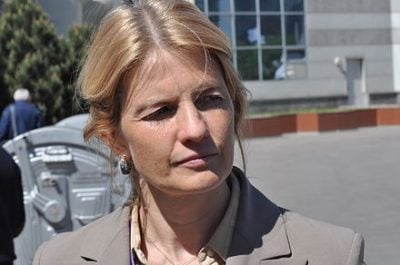From “Russian Hackers” to the “Manchurian Candidate”. The Point of View of Natalya Kasperskaya

The surname of Natalya is already very familiar to those using antiviruses. I will only add that she is now the General Director of the company “Info Watch”.
I met her in Moscow during the VI Conference on International Security, organised by the Russian Ministry of Defence. We were both part of a panel in a meeting on “Security of Information and Freedom of Access: the Contradictory Interrelations”. Natalya Kasperskaya, in her speech, showed that she does not believe in the narrative about ‘the almighty Russian hackers’ who were even able to influence the American presidential elections.
I asked her to explain what she was basing her incredulity on. She smiled:
“We know – and also the American experts know – that 95% of all crimes – illegal accesses, intrusions and disruptions of every kind even in the most protected corners of the Web – are never discovered. That is, the perpetrators remain unknown even by using the most sophisticated web searching systems”.
Of course, I thought. Would these Russian hackers – so powerful and marvelously organised – be nevertheless so naive to leave digital fingerprints that would make them easily identified? In this case they would be part of the 5% bunglers who are unable to hide.
“The issue is – said Natalya in her speech – that there are millions of viruses which can delete the identity of the perpetrator of a crime or cover it in such a way as to make it unrecognizable”. “So, is there any evidence about what the experts from NSA, CIA and FBI say? Is there any evidence about the fact that Russia has influenced the US election campaign, the most crucial democratic event of the most powerful country in the world?” “No evidence”.
Furthermore, on the basis of the considerations we have just made, one would say that there are infinite methods to stick fake labels on anyone using the Internet, making researches, doing business and bank transfers, sending and receiving contents of any kind. In conclusion, the Internet is the most ill-famed place in the world, exactly because it is the most frequented. And technologies – which are increasingly sophisticated and are developing at a faster and faster rate – are going to make the Internet the most deceitful place, where any information can be modified at will, turning the “truth” to “false” in a billion of variations. We already know – we all know since we have watched Avatar – that every picture can be “manipulated” to represent what is useful to those who want to deceive us. Anyone able to use a smartphone can do that. Let’s just imagine what a person whose job is organising terrorist attacks can do. We are finding this out, attack after attack.

Those who have watched “The Manchurian Candidate”, by Jonathan Demme (2004), know that at that time one was already able to literally delete a person from a movie shot and substitute it with another. A governmental agency secretly did that in order to prevent the public opinion from becoming aware of something: a conspiracy built up by another agency, in that case a non-governmental agency but equally powerful, a “corporation”. Today we know for sure that also sounds can be “manipulated”. There is a program (actually there are many), called Lyrebird, which allows to create a copy of a voice, using only a one-minute recording of the same voice. You have seen that in the movie Mission impossible III by J. J. Abrams, starring Tom Cruise. The movie came out in 2006, but it was directed some years earlier.
Do you remember now those 30 “strange” (strange because impossible) phone calls coming from aeroplanes which were flying at 4,000 meters of altitude on 9/11 2001? They were most likely synthetic voices. What is left to understand is who actually fabricated those calls, when and where they were coming from. Perhaps – but we doubt it – Mrs Boldrini will tell us, with the help of her debunkers.
Hollywood, which has deeply manipulated all of us, has also delivered us some messages, warning us in advance about what was happening: the greatness and the mocking brutality of the American cinema. But we did not realise that. It is easier to watch a sci-fi film than asking ourselves whether it is containing a message. The Truman Show, The Matrix, Three Days of the Condor: they all contain messages which we did not understand completely or did not notice at all.
And now there are those who are raising the “fake news” issue. They want us to believe that everything they told us and showed us until yesterday is the truth. They seem to ignore that when we will speak with someone at the telephone, we will have to take into account that it could be someone else than “him” or “her”.
But also the profession of voice-over actor will end, for example: the foreign actor will be able to “speak” in any language, using the correct pronunciation and through his “synthetic-but-real” voice; our favourite actor will tell us “goodnight”; and no contract will be authenticated by a telephone call anymore. What a shame: we will have to use pen and paper again. Getting back to the Moscow Conference from where we started: which “security of information” can we get in the future, as we live in a global village where we will not be able to distinguish a dog from a cat anymore?
Featured image: WikiVisually


